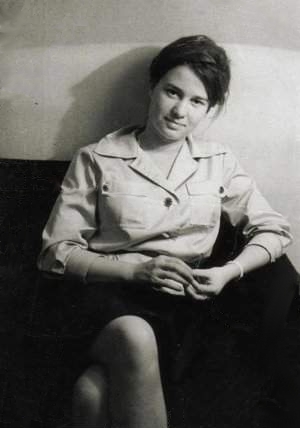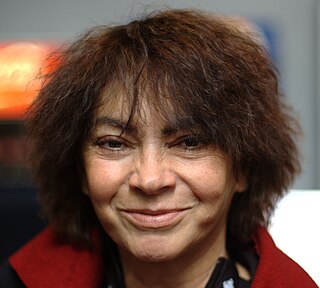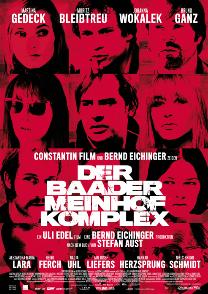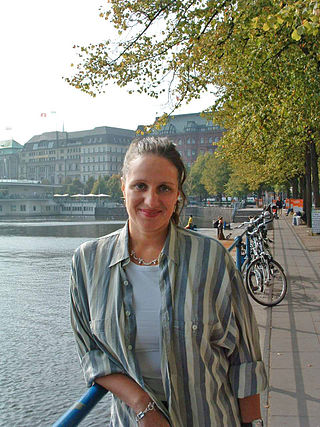
The Red Army Faction, also known as the Baader–Meinhof Group or Baader–Meinhof Gang, was a West German far-left militant group founded in 1970 and active until 1998. The RAF described itself as a communist and anti-imperialist urban guerrilla group. It was engaged in armed resistance against what it considered a fascist state. Members of the RAF generally used the Marxist–Leninist term faction when they wrote in English. Early leadership included Andreas Baader, Ulrike Meinhof, Gudrun Ensslin, and Horst Mahler. The West German government considered the RAF a terrorist organization.

Ulrike Marie Meinhof was a German left-wing journalist and founding member of the Red Army Faction (RAF) in West Germany, commonly referred to in the press as the "Baader-Meinhof gang". She is the reputed author of The Urban Guerilla Concept (1971). The manifesto acknowledges the RAF's "roots in the history of the student movement"; condemns "reformism" as "a brake on the anti-capitalist struggle"; and invokes Mao Zedong to define "armed struggle" as "the highest form of Marxism-Leninism".

Gudrun Ensslin was a German far-left terrorist and founder of the West German far-left militant group Red Army Faction.
The Japanese Red Army was a militant communist organization active from 1971 to 2001. It was designated a terrorist organization by Japan and the United States. The JRA was founded by Fusako Shigenobu and Tsuyoshi Okudaira in February 1971, and was most active in the 1970s and 1980s, operating mostly out of Lebanon with PFLP collaboration and funding from Muammar Gaddafi's Libya, as well as Syria and North Korea.
Klaus Rainer Röhl was a German journalist and author, best known as founder, owner, publisher and editor-in-chief of konkret, the most influential magazine on the German political left from the 1960s to the early 1970s. He later became critical of communism and leftist tendencies.

Masao Adachi is a Japanese screenwriter, director, actor and former Japanese Red Army member who was most active in the 1960s and 1970s. He was born in Fukuoka Prefecture.

Leila Khaled is a Palestinian refugee, former militant, and member of the Popular Front for the Liberation of Palestine (PFLP).

konkret has been the name of two German magazines.
Mei Shigenobu is a Japanese journalist. She is the daughter of Japanese Red Army leader Fusako Shigenobu and of an unknown Palestinian who was reportedly a member of the Popular Front for the Liberation of Palestine. Some news agencies have given her name as May Shigenobu.

The Raspberry Reich is a 2004 film by director Bruce LaBruce which explores what LaBruce calls "terrorist chic", cult dynamics, and the "innate radical potential of homosexual expression". It is about a contemporary terrorist group who set out to continue the work of the Red Army Faction (RAF), also known as the Baader-Meinhof Gang. The group consists of several young men and a female leader named Gudrun. All of the characters are named after either original members of the Baader-Meinhof Gang or revolutionaries such as Che Guevara.

Martina Gedeck is a German actress. She achieved wider international acclaim due to her roles in films such as Mostly Martha (2001), The Lives of Others (2006), and The Baader Meinhof Complex (2008). She has won several awards, including 2 Deutscher Filmpreis, in 1997 for Supporting Actress in Life is All You Get, and in 2002 for Actress in Mostly Martha.

Stammheim – Die Baader-Meinhof-Gruppe vor Gericht is a 1986 West German film directed by Reinhard Hauff. It tells the story of the trial in the court of Stammheim Prison of the left-wing Baader-Meinhof Group.

Jocelyne Saab was a Lebanese journalist and film director. She is recognized as one of the pioneers of Lebanese cinema. A reporter, photographer, scriptwriter, producer, director, artist and founder of the Cultural Resistance International Film Festival of Lebanon, Saab focused on the deprived and disadvantaged – from displaced peoples to exiled fighters, cities at war and a Fourth World without a voice. Her work is grounded in historic violence, and in an awareness of the actions and images required to document, reflect on and counteract it.

The Baader Meinhof Complex is a 2008 German drama film directed by Uli Edel. Written and produced by Bernd Eichinger, it stars Moritz Bleibtreu, Martina Gedeck, and Johanna Wokalek. The film is based on the 1985 German best selling non-fiction book of the same name by Stefan Aust. It retells the story of the early years of the West German far-left terrorist organisation the Rote Armee Fraktion from 1967 to 1977.
Fusako Shigenobu is a Japanese communist activist, writer, and the founder and leader of the now-disbanded militant group Japanese Red Army (JRA).
Shane O'Sullivan is an Irish writer and filmmaker based in London. He is best known for his work on the assassination of Robert Kennedy. His feature documentary RFK Must Die is the first theatrical documentary on the case since Ted Charach's The Second Gun, which was released in October 1973. His book on the case, Who Killed Bobby? The Unsolved Murder of Robert F. Kennedy was published by Union Square Press to coincide with the fortieth anniversary of the assassination on 5 June 2008.
Jutta Brückner is a German film director, screenwriter and film producer. She directed nine films between 1975 and 2005. Furthermore, she has written essays in film theory, film reviews and radio plays. She lives in Berlin and was Professor for narrative film at Berlin University of the Arts. She was the head of the jury at the 31st Berlin International Film Festival and is a member of multiple Film Juries and advisory committees.
Baader is a 2002 German film directed by Christopher Roth. It is a biopic about revolutionary Andreas Baader of the notorious Red Army Faction which operated mainly in West Germany during the 1970s.
Ulrike's Brain is a 2017 German-Canadian drama film directed by Bruce LaBruce. It was screened in the Forum section at the 67th Berlin International Film Festival.

Bettina Röhl is a German journalist and author. She is best known for her writings about student radicalism of the 1960s and the terrorist kidnappings that it spawned in West Germany during the early 1970s. Röhl has written extensively about the former Foreign Minister Joschka Fischer's time as a left-wing militant leader. She has also researched and written at length about her own mother, journalist and Red Army Faction terrorist Ulrike Meinhof. Her assessments of the violence associated with the Red Army Faction in the 1970s are at times intensely critical.












